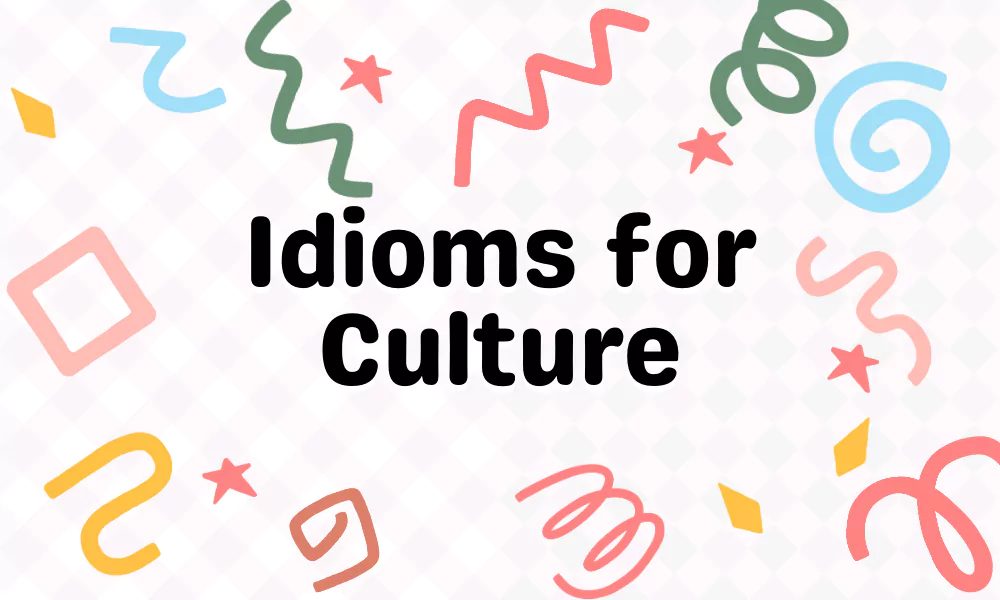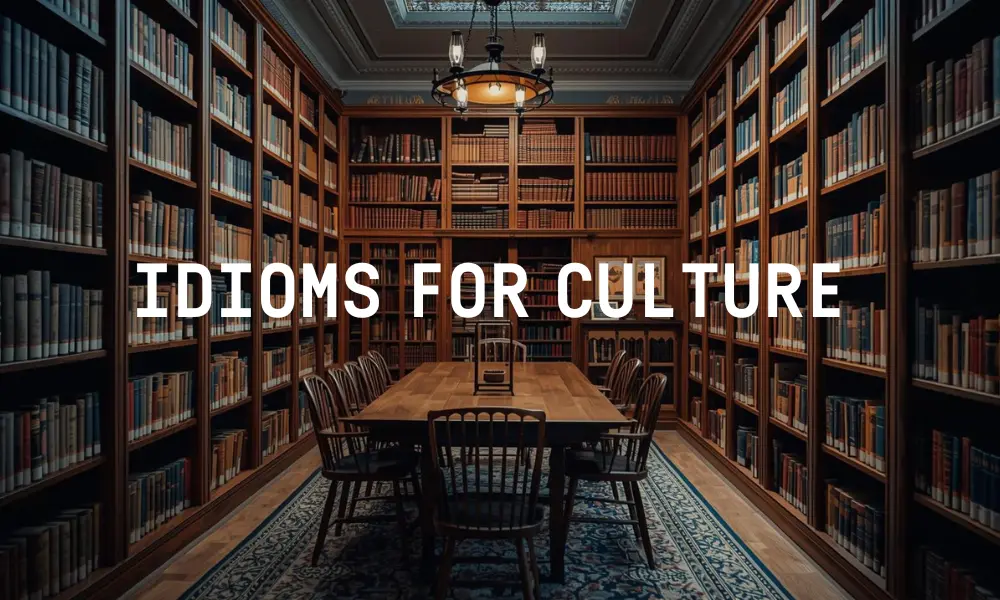Idioms for Culture – Expressions Reflecting Traditions, Values, and Heritage

Idioms for culture are more than just colorful expressions because they are reflections of the values, traditions, and shared experiences of a community. These figurative phrases capture the essence of how people think, feel, and connect with one another, often revealing insights into history and social norms. Expressions like “melting pot” or “burning the midnight oil” go beyond literal meaning to portray ideas of diversity, hard work, and belonging in ways that resonate across cultures.
What Are Idioms for Culture?
Idioms for culture are figurative expressions that capture the beliefs, traditions, and values of a community. They go beyond literal meanings and reflect how people view life, relationships, and society. For example, phrases like “melting pot” highlight diversity, while “build bridges” emphasizes unity and connection. These idioms not only enrich communication but also provide insight into the cultural mindset behind the language.

Commonly Used Idioms for Culture
- Melting pot – A place where different cultures blend.
Example: New York is often called a melting pot of cultures. - Cultural exchange – Sharing traditions and practices between groups.
Example: The festival promoted cultural exchange between students. - When in Rome, do as the Romans do – Adapt to the customs of the place you are in. Example: I don’t usually eat late dinners, but when in Rome, do as the Romans do.
- Lost in translation – Something that loses meaning when moved across cultures/languages.
Example: His joke was lost in translation at the international meeting. - Break the ice – To overcome cultural or social awkwardness.
Example: The host told a funny story to break the ice. - Build bridges – To connect people from different backgrounds.
Example: The art project helped build bridges between communities. - Cultural shock – Discomfort from experiencing a different culture.
Example: Moving abroad gave her a huge cultural shock. - Speak the same language – To share cultural understanding.
Example: Despite their differences, they spoke the same language of kindness. - Burning the midnight oil – Valuing hard work, often cultural.
Example: He was burning the midnight oil to finish his project. - Across the board – Something applying to all groups or cultures.
Example: The new law affects people across the board. - Old habits die hard – Cultural traditions are difficult to change.
Example: He still greets people formally; old habits die hard. - The salt of the earth – Honest, hardworking people within a culture.
Example: Farmers are often seen as the salt of the earth. - Under one roof – Different cultures or people together in one place.
Example: The museum displayed world traditions under one roof. - Different strokes for different folks – Different cultures have different tastes.
Example: Some like spicy food, others don’t; different strokes for different folks. - Know where you come from – To remember your culture and roots.
Example: She always told her kids to know where they come from. - Against the grain – Going against cultural norms.
Example: His views went against the grain of tradition. - The fabric of society – The essential cultural and social structures.
Example: Family is part of the fabric of society. - Pass the torch – Passing traditions or culture to the next generation.
Example: The elder passed the torch of leadership to his son. - The cream of the crop – The best in a group, culturally admired.
Example: The festival showcased the cream of the crop of artists. - Blend in – To adapt to a new culture.
Example: He quickly learned the language to blend in. - Culture vulture – Someone very interested in culture, arts, and traditions.
Example: She’s a real culture vulture who visits every museum. - Read between the lines – Understanding hidden cultural meaning.
Example: In that culture, you must read between the lines of what’s said. - The tip of the iceberg – Only a small part of a larger cultural truth.
Example: The customs we see are just the tip of the iceberg. - Carry the torch – To continue a tradition.
Example: The young activists carried the torch of equality. - It takes a village – Community and culture shape individuals.
Example: Raising children takes a village. - March to the beat of your own drum – Live differently from cultural norms.
Example: She always marched to the beat of her own drum. - Standing on ceremony – Strictly following cultural rules of formality.
Example: Don’t stand during the ceremony, just call me by my first name. - Every culture has a story – Every group carries traditions and beliefs.
Example: They discovered every culture has a story worth sharing. - Cross-cultural – Between two or more cultures.
Example: Cross-cultural friendships enrich perspectives. - Deep-rooted traditions – Long-lasting cultural habits.
Example: The dance is a deep-rooted tradition in their community. - Bridge the gap – Reduce cultural or generational differences.
Example: Education helps bridge the gap between cultures. - Time-honored tradition – A respected, old cultural practice.
Example: Lighting lamps is a time-honored tradition in India. - The apple doesn’t fall far from the tree – Cultural traits passed in families.
Example: He loves music like his parents, the apple doesn’t fall far from the tree. - By word of mouth – Sharing culture through oral tradition.
Example: Stories were passed down by word of mouth. - Old school – Traditional or cultural way of doing things.
Example: He’s very old school when it comes to manners. - Go with the flow – Adapting to cultural surroundings.
Example: When traveling, it’s best to go with the flow. - Like two peas in a pod – Similarity due to shared culture.
Example: They’re like two peas in a pod, loving the same traditions. - Raise the bar – Setting higher cultural or social standards.
Example: The film raised the bar for cultural storytelling. - Hand down – Passing culture or values to the next generation.
Example: Recipes were handed down for generations. - Out of step with – Not fitting into cultural norms.
Example: His views were out of step with society. - Put down roots – Settling into a culture or community.
Example: After years abroad, she finally put down roots at home. - The ties that bind – Cultural or family values connecting people.
Example: Traditions are the ties that bind communities together. - The grass is greener on the other side – Cultural envy or comparison.
Example: He thought life abroad would be easier, but the grass is greener on the other side. - Cultural mosaic – Different cultures living together but keeping individuality.
Example: Canada is known as a cultural mosaic. - Break tradition – To act against cultural expectations.
Example: She broke tradition by proposing to him. - Speak volumes – Cultural gestures or actions that say a lot.
Example: His silence spoke volumes about his respect. - Hand in hand – Culture and values going together.
Example: Music goes hand in hand with celebrations. - Worlds apart – Different cultures or mindsets.
Example: Their customs seemed worlds apart from ours. - Out of the ordinary – Something unusual in a cultural sense.
Example: The ceremony was out of the ordinary but beautiful. - Shared heritage – A collective cultural identity.
Example: The monuments represent our shared heritage.
Rare and Unique Idioms for Culture
- Dance to someone else’s tune – To follow another culture’s rules.
Example: He danced to someone else’s tune to fit in. - Dig where you stand – Respect your own culture and history.
Example: She learned to dig where she stood and value her roots. - Bells and whistles of tradition – Fancy cultural details.
Example: The wedding had all the bells and whistles of tradition. - Cloak of custom – Tradition that hides or influences behavior.
Example: Under the cloak of custom, people followed old rituals. - Thread of continuity – Cultural practices linking generations.
Example: Folklore provided a thread of continuity in their history. - Paint with the same brush – To generalize about a culture.
Example: Don’t paint all cultures with the same brush. - Ancient as the hills – A cultural practice that is very old.
Example: Their songs are ancient as the hills. - Echoes of the past – Cultural influences still present today.
Example: The architecture carried echoes of the past. - Stand the test of time – A cultural tradition lasting for ages.
Example: The custom of storytelling stood the test of time. - Carry cultural baggage – Attitudes shaped by culture that affect behavior.
Example: He carried cultural baggage into his relationships.
Read: Idioms For Unique
Culture Idioms in Literature and Pop Culture
- Big Brother – From George Orwell’s 1984, symbolizing cultural surveillance.
Example: Many fear technology has become like Big Brother. - Cultural desert – From critiques of societies lacking art or traditions.
Example: Without theaters, the town felt like a cultural desert. - Star-crossed lovers – From Shakespeare, reflecting cultural fate in love.
Example: Romeo and Juliet are star-crossed lovers. - Through the looking glass – From Lewis Carroll, meaning strange cultural perspective.
Example: Visiting the foreign land felt like going through the looking glass. - The American Dream – A cultural idiom in literature and life.
Example: His story represents the American Dream. - Pandora’s box – From Greek myth, meaning unleashing cultural trouble.
Example: Changing tradition opened a Pandora’s box of problems. - Cultural wasteland – A critique of societies in literature.
Example: T. S. Eliot’s work describes a cultural wasteland. - Tower of Babel – From the Bible, symbolizing cultural and language confusion.
Example: The meeting was like a Tower of Babel. - Brave New World – From Aldous Huxley, referring to cultural shifts or dystopias. Example: Technology created a brave new world of communication.
- The melting pot – Popularized in early 20th-century literature to describe cultural diversity.
Example: The novel portrayed America as the melting pot.

Synonyms and Alternatives for Culture
| Synonym | Meaning |
|---|---|
| Heritage | Traditions, practices, and values passed down through generations. |
| Civilization | The stage of human development marked by social structures, laws, and arts. |
| Customs | Specific practices or habits followed by a community. |
| Tradition | Long-standing beliefs or activities maintained within a society. |
| Way of life | The everyday lifestyle and practices that define a group. |
| Ethos | The guiding spirit, values, or moral character of a community. |
| Legacy | The cultural, social, or historical inheritance of a group. |
| Folklore | Stories, myths, and practices that reflect cultural identity. |
| Norms | Shared rules and expectations that shape social behavior. |
| Identity | The sense of belonging and distinctiveness tied to cultural roots. |
Unique Tips for Using Culture Idioms in Writing and Speech
- Match the context – Use idioms that suit the cultural or social theme of your writing, rather than forcing them.
- Balance idioms with clarity – Don’t overload your speech or text with idioms; mix them with simple language to keep the message clear.
- Use cross-cultural idioms carefully – Remember that not all idioms translate well across languages, so explain when needed.
- Add flavor in storytelling – Culture idioms are perfect for essays, speeches, or creative writing to make your content lively and relatable.
- Learn the origin – Understanding where an idiom comes from helps you use it accurately and makes your writing more authentic.
Read: Idioms For Math
Read: Idioms For Getting Married
FAQs
Conclusion
Idioms for culture are more than colorful expressions, they are reflections of traditions, values, and the shared experiences of societies. From common phrases like “melting pot” to literary idioms like “Tower of Babel”, these expressions enrich communication and provide insights into the identity and beliefs of different communities. By learning and using culture-related idioms, language learners not only improve fluency but also gain a deeper understanding of the social and historical contexts that shape conversations.
